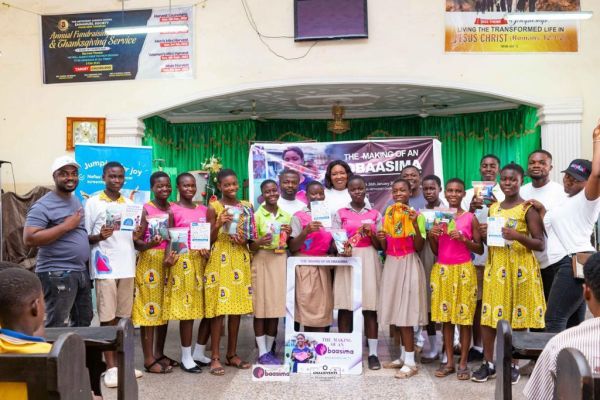The Obaasima Project, an initiative by #TeamTaadi, an 8-member group of students from Kwame Nkrumah University of Science and Technology (KNUST), has provided hands-on training on the making of reusable pads, detergents and education on good menstrual hygiene to about 300 pupils of Nana Baidoo Bonsoe and Methodist Basic School, both at Poasi, New Takoradi, in Sekondi-Takoradi.
The team further distributed about 250 pieces of reusable sanitation pads, five (5) boxes (80 pieces) of paper towels, 250 exercise books and pens, as well as other educational materials and souvenirs to the pupils.
#TeamTaadi also facilitated the registration of 100 pupils (58% female) onto the National Health Insurance Scheme.
#TeamTaadi also formed a 10-member Obaasima Club in the school to serve as peer educators on menstrual hygiene and other health related issues.
In educating the pupils, Henrietta Ataah Kaakyire, an officer from Marie Stopes International, Ghana, educated the girls on understanding the menstrual cycle and ensuring good personal hygiene during menstruation. She also educated the girls on proper disposal of used sanitary pads.
During the education, she explained that “some girls have between 3 -7 days to menstruate. Therefore, it is very important for each girl to understand their menstrual cycle and also ensure menstrual proper hygiene so as to prevent them from body odor. Girls must visit the hospital to seek professional advice on any unwanted symptoms instead of self-medicating which could have dire consequences on their menstrual health.During this period, please abstain from sex lest you become pregnant”.
Alberta Hagan, a nurse, also entreated the pupils to “eat a balanced diet and maintain good personal hygiene”.
The project also registered one hundred pupils onto the NHIS scheme.
According to the NHIS District Office, 42 of the 100 pupils were new registrants while the remaining 58 pupils renewed their registrations. About 58% of total registrants were female.
The Obaasima Project is essentially a menstrual health and/or hygiene drive to reduce menstrual poverty among girls in deprived areas.
This is an important component of promoting gender equality, ensuring access to education and health, and achieving several Sustainable Development Goals (SDGs) set by the United Nations.
Therefore, the making of an Obaasima is critical to achieving several of the SDGs, and promoting menstrual health and hygiene is essential for advancing gender equality, promoting health and well-being, and reducing inequalities.
The Obaasima Project, by #TeamTaadi, is a requirement for MSc Development Management by the Institute of Distance Learning (IDL) where team members are expected to identify and undertake a Social Entrepreneurship and Philanthropy (SEAP) project in the society.
Source: Naomi Obenewaah/Peace News
| Disclaimer: Opinions expressed here are those of the writers and do not reflect those of Peacefmonline.com. Peacefmonline.com accepts no responsibility legal or otherwise for their accuracy of content. Please report any inappropriate content to us, and we will evaluate it as a matter of priority. |
Featured Video
















